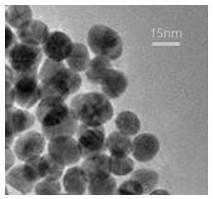A kind of preparation method of polyphenylene ether
A polyphenylene ether and polymer technology, applied in the field of engineering material polyphenylene ether preparation, can solve the problems of high toxicity, environmental pollution, low yield, etc.
- Summary
- Abstract
- Description
- Claims
- Application Information
AI Technical Summary
Problems solved by technology
Method used
Image
Examples
Embodiment 1
[0026] Put 2.23g (10mmol) of copper bromide into a PTFE-lined autoclave, add an appropriate amount of ethanol, mix well, cover the lid tightly, place in a muffle furnace, control the temperature at 200°C, and react for 18 hours . After the reaction is completed, take out the reaction kettle, cool to room temperature, vacuum filter under reduced pressure, wash with ethanol, and vacuum-dry the product obtained by suction filtration to obtain nano-cuprous bromide. Weigh nano-cuprous bromide (0.1g) into a four-necked flask, then add dimethyl n-butylamine (4mL), the molar ratio of nano-cuprous bromide and dimethyl n-butylamine is 1:50, The color becomes pale yellow, then add 30ml of tetrahydrofuran as solvent, the color turns to yellow-green, put the device on the magnetic stirrer, start stirring and let oxygen into the oxygen for 5 minutes, then add 2.2ml of tetrahydrofuran into the four-necked flask 2,6-Xylenol (2.5g, 18mmol), continue to feed oxygen for 2 hours, after reacting ...
Embodiment 2
[0028] According to the method and operation steps of Example 1, the process of introducing oxygen in Example 1 was changed to the process of introducing air to obtain 1.87 g of light yellow polyphenylene ether with a yield of 74.80%. It can be seen that replacing oxygen with air does not have much influence on the yield and quality of polyphenylene ether.
Embodiment 3
[0030] According to the method and operation steps of Example 2, the nano-sized cuprous bromide in Example 2 was changed to commercial cuprous bromide to obtain 1.03 g of light yellow polyphenylene ether with a yield of 41.20%. It can be seen that the catalytic activity of nano-sized cuprous bromide provided by the present invention is much higher than that of commercial cuprous bromide by adopting the process of feeding air.
PUM
| Property | Measurement | Unit |
|---|---|---|
| melting point | aaaaa | aaaaa |
| crystallinity | aaaaa | aaaaa |
| oxygen index | aaaaa | aaaaa |
Abstract
Description
Claims
Application Information
 Login to View More
Login to View More - R&D
- Intellectual Property
- Life Sciences
- Materials
- Tech Scout
- Unparalleled Data Quality
- Higher Quality Content
- 60% Fewer Hallucinations
Browse by: Latest US Patents, China's latest patents, Technical Efficacy Thesaurus, Application Domain, Technology Topic, Popular Technical Reports.
© 2025 PatSnap. All rights reserved.Legal|Privacy policy|Modern Slavery Act Transparency Statement|Sitemap|About US| Contact US: help@patsnap.com


